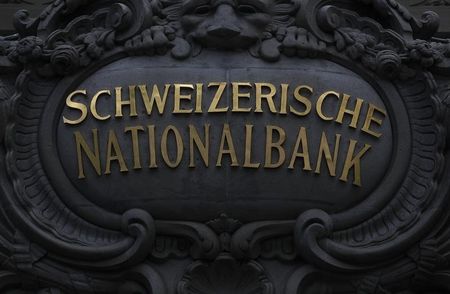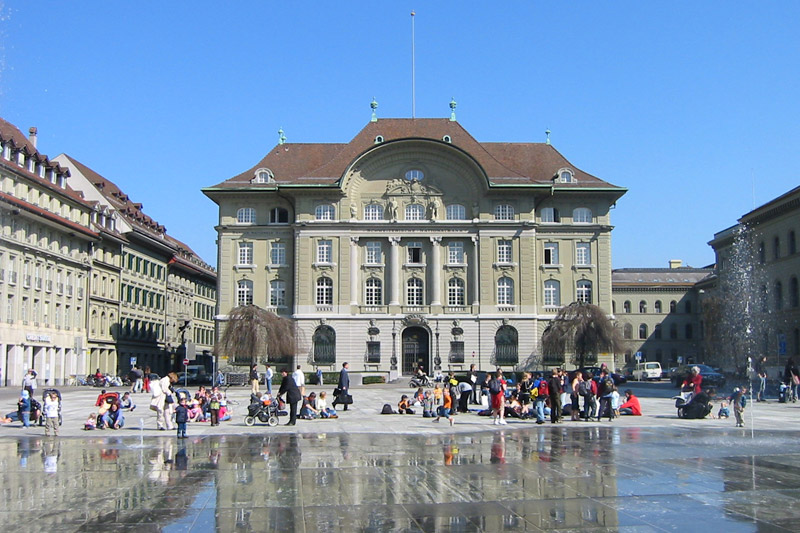By Alice Baghdjian and Silke Koltrowitz ZURICH (Reuters) - The Swiss National Bank faces the biggest test of its cap on the franc in two years but may find it easier to defend now than when euro zone breakup fears were rampant and the strategy unproven.
The franc rose to its strongest level since September 2012 on Friday, brushing up against the 1.20 euro limit the Swiss National Bank introduced in 2011 when the currency's strength was squeezing exporters and threatening deflation.
Renewed weakness in the euro zone, and the European Central Bank's readiness to use radical measures to kick-start the economy, have fired up demand for the franc.
A referendum this month on Swiss gold reserves is also playing a role. While approval seems unlikely, a Yes vote would force the SNB to buy gold alongside any currency interventions.
Still, capital flows into Switzerland have declined sharply from the height of the euro crisis, as have fears that the interventions would spark inflation.
More importantly, the SNB's success in defending the cap back in 2011 and 2012 means it may not have to intervene on the same scale to fend off any new market challenges.
"The difference between now and 2011 is that the wider markets and most economists believe these interventions can break the neck of speculation," said Rudolf Strahm, an economist and former Swiss lawmaker.
"Some market players tried once to attack the franc but all they got was a bloodied nose and lost vast sums of money. Since then no one has dared to try again."
INTERVENTION POINT
The franc was trading at 1.2015 per euro by 1200 GMT on Friday, close to the 1.2010 francs per euro level where economists say the SNB has intervened in the past.
The SNB shocked markets when it imposed the limit in September 2011 after the currency shot to record highs against the euro. The following year, as fears of a Greek exit from the euro zone grew, traders unsuccessfully challenged the cap. It has since become the backbone of SNB policy.
The latest bout of franc strength is unlikely to prompt such intense purchases, economists say.
The SNB poured billions of francs into the market until September 2012 to establish the limit, swelling its currency reserves, now around 460 billion Swiss francs ($475 billion) or about 70 percent of gross domestic product (GDP).
The cap was breached only once in April 2012, adding credibility to the central bank's pledge to defend the policy with the utmost determination and purchase foreign currency in unlimited amounts to do so.
"It is possible that the SNB intervenes in coming days or weeks, but we would not expect the same level of interventions as in 2012," said Maxime Botteron, a Credit Suisse economist.
Back then, Swiss investors were repatriating foreign funds out of fear for the euro zone. Anxiety has since subsided.
Stagnating prices and faltering economic growth in Switzerland have silenced critics who warned of inflationary risks from the interventions and has underscored the need for the cap to ward off deflation.
The policy has garnered support from exporters and tacit approval from other central banks. The risks from the vast purchases are limited because losses on forex reserves are pure accounting losses, economists say, though the bank will need to unwind the reserves at some point.
"We really don't see any inflationary pressure yet, even for the next one or two years, so there is no real limit to balance sheet expansion," said Botteron. "From our point of view, the exchange rate floor brings more benefits than costs."
This could change quickly if the nation votes on Nov. 30 to oblige the central bank to hold at least 20 percent of its reserves in gold, up from 7 percent currently. However, polls show limited support.
SNB Chairman Thomas Jordan has gone out of his way to warn of the risks attached to the proposal.
The alternative to interventions would be negative interest rates. But that could add fuel to Switzerland's real estate boom and prove expensive for its large financial sector.

(Editing by Noah Barkin/Ruth Pitchford)
